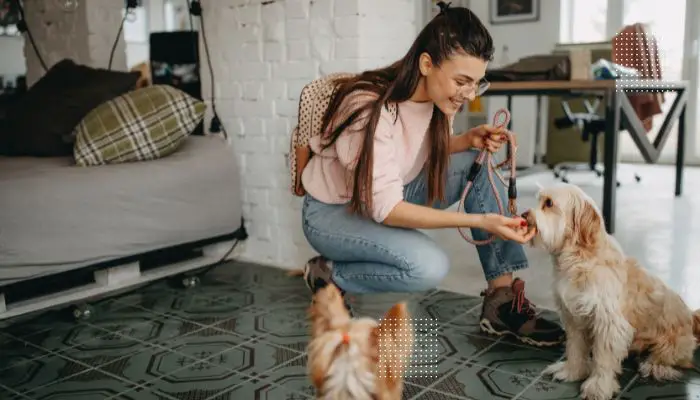
There could be a number of reasons why your poodle is behaving clingy and needy. Some possible causes include:
Lack of socialization or training: Poodles, like all dogs, need proper socialization and training in order to feel confident and secure in a variety of situations. If your poodle has not received enough socialization or training, it may be more clingy and needy as a result.
Separation anxiety: Separation anxiety is a common issue in dogs, and it can cause them to become clingy and needy when their owners are present, as they are afraid of being left alone.
Health issues: If your poodle is experiencing any health issues, it may be more clingy and needy as a result. This could be due to pain, discomfort, or a general feeling of unwellness.
Lack of exercise or mental stimulation: Poodles, like all dogs, need plenty of exercise and mental stimulation in order to stay healthy and happy. If your poodle is not getting enough of these things, it may become clingy and needy as a result.
Fear or anxiety: If your poodle is experiencing fear or anxiety, it may become clingy and needy in an effort to seek comfort and reassurance from its owner.
It’s important to try to identify the underlying cause of your poodle’s clingy and needy behavior in order to address the issue and help your poodle feel more confident and secure. If you’re not sure what is causing the behavior, it may be helpful to consult with a veterinarian or a professional dog trainer for guidance.
Likely Causes Behind Your Poodle’s Neediness
Here is a list of possible causes behind your poodle’s neediness:
- Lack of socialization or training
- Separation anxiety
- Health issues
- Lack of exercise or mental stimulation
- Fear or anxiety
Could Clingy Behavior Be Caused By a Health Issue?
Yes, it is possible that clingy behavior in a poodle could be caused by a health issue. If your poodle is experiencing any physical discomfort or pain, it may become more clingy and needy as a result. This could be due to a variety of health issues, such as an injury, an illness, or an underlying medical condition. It’s important to pay close attention to your poodle’s behavior and to consult with a veterinarian if you notice any changes that may be related to a health issue. Your veterinarian will be able to perform a thorough examination and determine the cause of your poodle’s behavior. If necessary, they may recommend treatment or medication to help manage your poodle’s health issue and reduce clingy behavior.
Are Poodles More Predisposed To Clingy Behavior?
It’s not accurate to say that poodles are more predisposed to clingy behavior than other breeds of dogs. Clingy behavior can occur in any breed of dog and can be caused by a variety of factors, including lack of socialization or training, separation anxiety, health issues, lack of exercise or mental stimulation, and fear or anxiety. That being said, it’s important to note that every dog is an individual and may exhibit different behaviors and characteristics based on their genetics, environment, and individual experiences. If you’re concerned about your poodle’s clingy behavior, it’s important to try to identify the underlying cause and address it appropriately. If you’re not sure what is causing the behavior, it may be helpful to consult with a veterinarian or a professional dog trainer for guidance.
How To Manage Your Poodle’s Needy Behavior
Here are some steps you can take to manage your poodle’s needy behavior:
Identify the cause: The first step in managing your poodle’s needy behavior is to try to identify the underlying cause. Is your poodle experiencing separation anxiety? Is it not getting enough exercise or mental stimulation? Is it experiencing any health issues? Understanding the root cause of the behavior will help you develop a plan to address it.
Provide plenty of exercise and mental stimulation: Poodles, like all dogs, need plenty of exercise and mental stimulation in order to stay healthy and happy. Make sure your poodle is getting enough of both on a daily basis.
Practice positive reinforcement training: Positive reinforcement training involves reinforcing desired behaviors with rewards, such as treats or praise. This can help your poodle feel more confident and secure, and can also help reduce clingy behavior.
Gradually increase the time you spend away from your poodle: If your poodle has separation anxiety, it may help to gradually increase the time you spend away from your poodle. Start by leaving your poodle alone for short periods of time, and gradually increase the length of time as your poodle becomes more comfortable.
Seek help if necessary: If you’re not sure what is causing your poodle’s clingy behavior or if you’re having trouble managing the behavior on your own, it may be helpful to seek help from a veterinarian or a professional dog trainer. They can provide guidance and support to help you address the issue and improve your poodle’s behavior.
It’s important to be patient and consistent as you work to manage your poodle’s clingy behavior. It may take time and effort, but with the right approach, you can help your poodle feel more confident and secure.
Things To Do If Your Dog Gets Too Clingy
If your dog is becoming too clingy, there are a few things you can try to address the issue:
Identify the cause: The first step in managing your dog’s clingy behavior is to try to identify the underlying cause. Is your dog experiencing separation anxiety? Is it not getting enough exercise or mental stimulation? Is it experiencing any health issues? Understanding the root cause of the behavior will help you develop a plan to address it.
Provide plenty of exercise and mental stimulation: Dogs need plenty of exercise and mental stimulation in order to stay healthy and happy. Make sure your dog is getting enough of both on a daily basis.
Practice positive reinforcement training: Positive reinforcement training involves reinforcing desired behaviors with rewards, such as treats or praise. This can help your dog feel more confident and secure, and can also help reduce clingy behavior.
Gradually increase the time you spend away from your dog: If your dog has separation anxiety, it may help to gradually increase the time you spend away from your dog. Start by leaving your dog alone for short periods of time, and gradually increase the length of time as your dog becomes more comfortable.
Seek help if necessary: If you’re not sure what is causing your dog’s clingy behavior or if you’re having trouble managing the behavior on your own, it may be helpful to seek help from a veterinarian or a professional dog trainer. They can provide guidance and support to help you address the issue and improve your dog’s behavior.
It’s important to be patient and consistent as you work to manage your dog’s clingy behavior. It may take time and effort, but with the right approach, you can help your dog feel more confident and secure.
Are toy poodles clingy
Toy poodles, like all dogs, can exhibit clingy behavior for a variety of reasons. It’s not accurate to say that toy poodles are more prone to clingy behavior than other breeds of dogs. Clingy behavior can occur in any breed of dog and can be caused by a variety of factors, including lack of socialization or training, separation anxiety, health issues, lack of exercise or mental stimulation, and fear or anxiety. It’s important to pay close attention to your toy poodle’s behavior and to try to identify the underlying cause if you notice that your toy poodle is exhibiting clingy behavior. If you’re not sure what is causing the behavior, it may be helpful to consult with a veterinarian or a professional dog trainer for guidance.
Are standard poodles clingy
Standard poodles, like all dogs, can exhibit clingy behavior for a variety of reasons. It’s not accurate to say that standard poodles are more prone to clingy behavior than other breeds of dogs. Clingy behavior can occur in any breed of dog and can be caused by a variety of factors, including lack of socialization or training, separation anxiety, health issues, lack of exercise or mental stimulation, and fear or anxiety. It’s important to pay close attention to your standard poodle’s behavior and to try to identify the underlying cause if you notice that your standard poodle is exhibiting clingy behavior. If you’re not sure what is causing the behavior, it may be helpful to consult with a veterinarian or a professional dog trainer for guidance.
Are miniature poodles clingy
Miniature poodles, like all dogs, can exhibit clingy behavior for a variety of reasons. It’s not accurate to say that miniature poodles are more prone to clingy behavior than other breeds of dogs. Clingy behavior can occur in any breed of dog and can be caused by a variety of factors, including lack of socialization or training, separation anxiety, health issues, lack of exercise or mental stimulation, and fear or anxiety. It’s important to pay close attention to your miniature poodle’s behavior and to try to identify the underlying cause if you notice that your miniature poodle is exhibiting clingy behavior. If you’re not sure what is causing the behavior, it may be helpful to consult with a veterinarian or a professional dog trainer for guidance.
Do Poodles Attach to One Person Only?
Poodles, like all dogs, can develop strong bonds with their owners and may show a preference for one person over others. However, it’s not accurate to say that poodles only attach to one person. Poodles, like all dogs, are highly social animals and can form strong bonds with multiple people, including family members, friends, and caregivers.
It’s important to socialize your poodle and expose it to a variety of people, especially during its early development, in order to help it become comfortable and confident around different people. This will help your poodle learn to interact with and trust a wide range of people, rather than just one person.
If your poodle does show a preference for one person, it’s important to make sure that all family members and caregivers are involved in caring for and interacting with your poodle. This will help to ensure that your poodle forms strong bonds with multiple people and is not overly reliant on one person.
Related: Why do people hate poodles?
Do poodles need another dog?
Poodles, like all dogs, can benefit from having a companion, whether it be another dog or a human. Having a companion can provide socialization, mental stimulation, and a sense of security for your poodle.
However, it’s not necessary for poodles to have another dog as a companion. Poodles can be happy and well-adjusted with just human companionship, as long as they receive enough socialization, exercise, and mental stimulation.
If you do decide to get a second dog for your poodle, it’s important to carefully consider the personality, size, and energy level of the new dog in order to ensure that the two dogs are compatible. It’s also important to properly introduce the dogs and supervise their interactions in order to ensure a smooth transition and prevent any conflicts.
Ultimately, the decision of whether or not to get a second dog for your poodle will depend on your individual circumstances and the needs and preferences of your poodle. It’s important to consider all of the factors and make a decision that is best for your poodle and your household.
Next Read:
Unlock the Intelligence of Your Smart Toy
